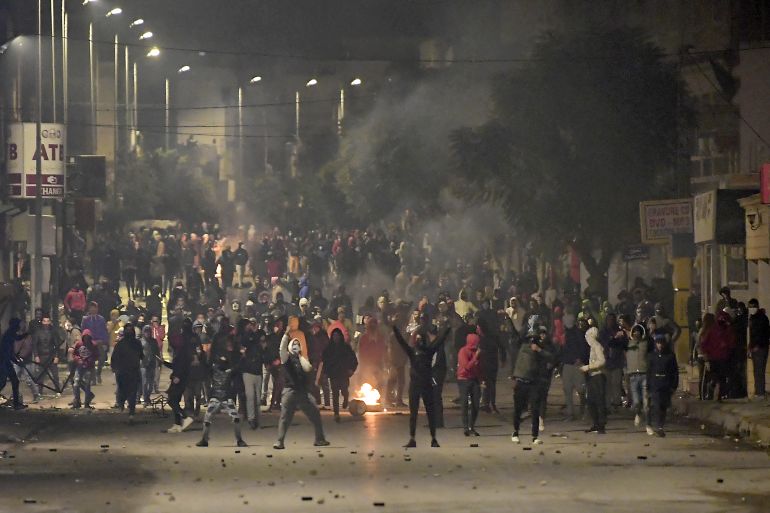Tunisian youth vow to continue protests amid economic woes
Protesters and security forces clash in several cities as President Kais Saied, PM Hichem Mechichi urge restraint.

Tunisian protesters have clashed with police for the fifth night in several cities, including the capital Tunis and Sidi Bouzid, cradle of the Arab Spring uprisings, as anger and frustration mount over economic hardship deepened by the pandemic.
Earlier on Tuesday, protesters rallied in Tunis, reviving the chant that rang out a decade ago in a revolution that ushered in democracy: “The people want the fall of the regime.”
Keep reading
list of 4 items‘Over 600 arrested, army deployed’ as unrest spreads in Tunisia
Tunisian PM appoints new ministers in cabinet reshuffle
A decade after revolution, Tunisia’s women face an uphill battle
In Sidi Bouzid, where the 2011 revolution began, witnesses told Reuters news agency that police had fired tear gas to disperse protesters who were raising slogans against politicians and demanding an end to decades of marginalisation.
Clashes also broke out in poor areas of Tunis, including el-Tadamen and Sijoumi, as hundreds of angry youths burned tyres and blocked roads.
Daytime protests in recent days demanding jobs, dignity and the release of detainees have been followed by nighttime violence, with COVID-19 restrictions compounding a wider economic malaise.
“The whole system must go … We will return to the streets and we will regain our rights and our dignity that a corrupt elite seized after the revolution,” said Maher Abid, a protester who is unemployed.
Shortly before last week’s 10th anniversary of the revolution, Prime Minister Hichem Mechichi’s government ordered a four-day lockdown and a tighter night-time curfew against the coronavirus pandemic, as well as a ban on protests.
However, in cities across Tunisia, youths have thrown stones and petrol bombs, burned tyres and looted shops while police used tear gas and batons on them, arresting hundreds.
‘Your anger is legitimate’
Mechichi said in a speech on national television on Tuesday that the government was listening to the demonstrators’ demands.
“I am aware that there are great anger and frustration in many areas, for the economic and social situation is in crisis and that has been deepened by the COVID crisis with its economic implications and measures it necessitated to preserve the health of Tunisians and that limited some personal freedoms such as the freedom of movement.”
“Your voice is heard and your anger is legitimate… Do not allow saboteurs among you,” he said, addressing protesters.
On Tuesday, up to 250 people gathered on Bourguiba Avenue in central Tunis while other demonstrations took place in towns near Sidi Bouzid.
Protesters in all three rallies chanted “the people want the fall of the regime”, and called for more jobs.
Tunisia’s economic crisis, unemployment and lack of basic services – all deepened by the pandemic – have angered protesters.
The protests have led to a harsh response from authorities who fear a repeat of the protests that led to the overthrow of longtime President Zine al-Abidine Ben Ali 10 years ago.
Earlier, the powerful labour union and other rights groups voiced support for peaceful protests against “policies of marginalisation, impoverishment and starvation”, accusing the state of squandering the revolution’s hopes.